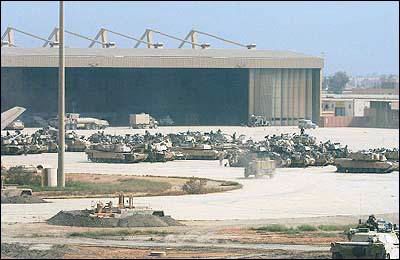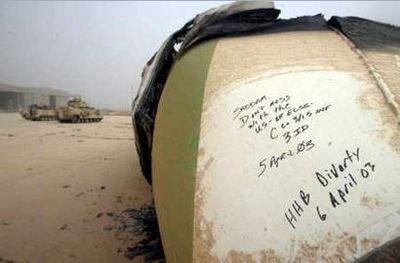On The Front Line In Forward USAF Posts
 The death of a Department of the Air
Force civilian in Iraq August 8th brings attention to some of the
unsung heroes of the war effort: thousands of Army, Air Force,
Marine Corps and Navy civilian employees who have voluntarily put
themselves in harm's way to support the war on terror.
The death of a Department of the Air
Force civilian in Iraq August 8th brings attention to some of the
unsung heroes of the war effort: thousands of Army, Air Force,
Marine Corps and Navy civilian employees who have voluntarily put
themselves in harm's way to support the war on terror.
Special Agent Rick Ulbright, a 49-year-old polygraph examiner
with the 33rd Field Investigative Squadron at Andrews Air Force
Base (MD) died at Kirkuk Air Base, Iraq, from wounds received
during a mortar attack.
Ulbright had been in Iraq for more than two months, providing
polygraph support for counterintelligence and counterterrorism
efforts, according to Bryan Horaist, chief of the Air Force Office
of Special Investigations' Regional Office at Randolph Air Force
Base, Texas. He was scheduled to return home in September.
Like the thousands of other Army, Navy, Air Force and Marine
Corps civilian employees forward deployed in Southwest Asia,
Ulbright "was an integral part of the effort," said Horaist, a
personal friend who attended Ulbright's Aug. 13 memorial service in
the Washington area. "He wanted to be there," said Horaist.
Ulbright was among about 1,400 Department of Defense civilians
who have volunteered for duty in Iraq, according to Lt. Col. David
Farlow, a spokesman for US Central Command in Baghdad. Most wear
desert camouflage uniforms, just like their military counterparts,
with "DoD Civilian" tags on their chests, alongside their
names.

Department of Army civilians have the biggest on-the-ground
presence, with 2,189 deployed to the Central Command theater,
according to Maj. Shawn Jirik from Headquarters, Department of the
Army Public Affairs. Another 4,411 Army contractors are also
deployed.
Among the Army civilians in Southwest Asia are more than 250
Army Corps of Engineers employees, working across Iraq to rebuild
the country's infrastructure, according to Mitch Frazier, deputy
chief of public affairs for the Corps of Engineers' Gulf Region
Division in Baghdad and a Department of Army civilian.
The Air Force reports 35 employees in its workforce forward
deployed to the CENTCOM area, according to Air Force spokeswoman
Jennifer Stephens. In addition to criminal investigation support,
they are providing equipment, air traffic control, information
technology, finance and intelligence support.
Marine Corps officials said five Marine civilian employees are
deployed to Southwest Asia. No numbers were available for Navy
civilian employees.
Army Lt. Col. Jeffrey Ogden, who supervises 12 Army Corps of
Engineers civilians in Iraq, said he's "very impressed" by the
commitment he's witnessed among the volunteers, all serving 120-day
deployments. "They want to be here and they want to make a
contribution," said Ogden, who heads the Restore Iraqi Electricity
Directorate. "They've jumped right in, hit the ground running and
show no hesitation about going outside the international zone. They
know they have a job to do and they go out there and do it."
Robert Dennis, a Corps of Engineer employee from Clarkesville
(VA), who has been in Iraq since May, said he volunteered for the
duty so he could play a critical role in the war on terror. "When
(the terrorists) attacked New York, they attacked all of us," he
said. "For me, I knew it was time to come forward and do what I
could."
Sharon Walker, an Army civilian for the Military District of
Washington serving a six-month tour at the Coalition Press
Information Center in Baghdad, agreed that the events of Sept. 11,
2001, "definitely had an effect on me and my decision to volunteer
in Iraq." She said thinking about the terror and pain caused by the
terrorist attacks made her more resolved than ever to do whatever
she could to support the troops. "This volunteer opportunity came
up, and it was the natural next step for me," she said.
Beth Hilliard, a civilian employee from the Corps of Engineers'
Savannah District Office, said she volunteered to serve four months
in Iraq simply because "it was the right thing to do, something
that was going to help the Iraqi people."
Hilliard shrugged off the dangers involved in the deployment.
"Different incidents go on here, but the mission takes priority,"
she said.

Walker said the preparation she received before deploying, both
at Fort Myer (VA) and Fort Bliss (TX) has proved invaluable in
Iraq, particularly training in nuclear-biological-chemical
protection, common skills and day-to-day soldier skills, such as
how to pack a rucksack.
The duty has some rough aspects that many of her civilian
counterparts never encounter, Walker acknowledged. She used the
example of the time her plane made a "battle landing" into Baghdad
International Airport.
"I get some adrenaline going sometimes when mortars hit near us,
but that helps me get up off my chair," she said. "Talking to
people helps me cope. Our interaction always improves my
understanding and attitude."
But after several weeks in Iraq, Walker said, she believes she's
making a meaningful contribution to the war on terror. "I'm
supposed to be here doing this work," Said convincingly.
With "just 16 days and a wakeup call" left on his 120-day
deployment, Dennis said he's found tremendous satisfaction in the
work he and his fellow Corps of Engineers coworkers are doing,
restoring electricity to Iraq. "We're turning the lights back on
and making a huge difference in people's lives," he said.
"We're doing a lot of good work," agreed Hilliard. "We're really
putting megawatts on the (power) grid and helping these folks."
Her advice to other civilians within Department of Defense
considering service in Southwest Asia? "The job is very challenging
and the work is fast-paced, but it's very rewarding," she said.
"Overall, I'm glad I volunteered. And the longer I'm here, the more
I feel that way."
(ANN salutes military correspondent Donna Miller)
 ANN's Daily Aero-Term (04.20.24): Light Gun
ANN's Daily Aero-Term (04.20.24): Light Gun Aero-News: Quote of the Day (04.20.24)
Aero-News: Quote of the Day (04.20.24) ANN's Daily Aero-Linx (04.21.24)
ANN's Daily Aero-Linx (04.21.24) Aero-News: Quote of the Day (04.21.24)
Aero-News: Quote of the Day (04.21.24) ANN's Daily Aero-Term (04.21.24): Aircraft Conflict
ANN's Daily Aero-Term (04.21.24): Aircraft Conflict





